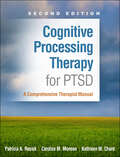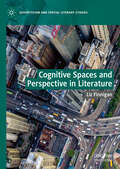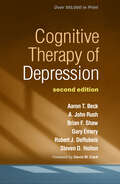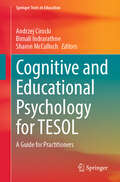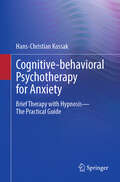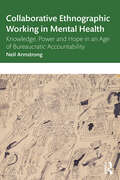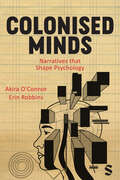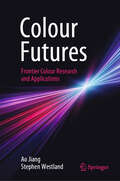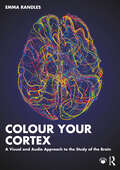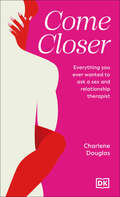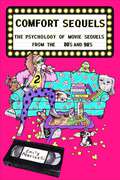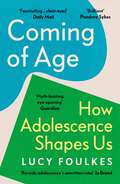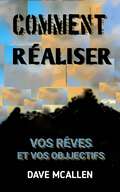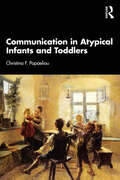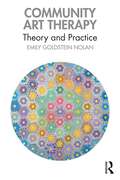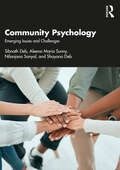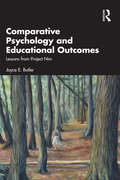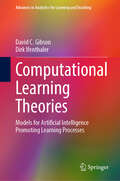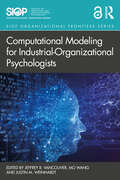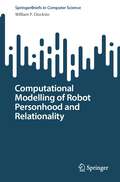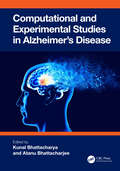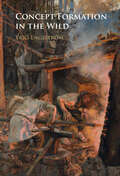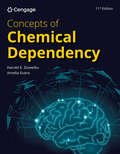- Table View
- List View
Cognitive Processing Therapy for PTSD: A Comprehensive Therapist Manual
by Candice M. Monson Patricia A. Resick Kathleen M. ChardThe authoritative presentation of cognitive processing therapy (CPT) for posttraumatic stress disorder (PTSD) is now in a revised and updated second edition, with an easier-to-use format and a new chapter on conceptualizing treatment. From CPT's developers, the manual includes session-by-session implementation guidelines and extensive sample dialogues. Shaded index tabs in the margins help clinicians quickly navigate to each session. The authors explain the theoretical and empirical underpinnings of CPT and discuss ways to work effectively with specific populations, such as combat veterans, sexual assault survivors, and culturally diverse and LGBTQIA+ clients. Forty-eight reproducible handouts can be photocopied from the large-size book or downloaded from the companion webpage. New to This Edition *Each session now has its own chapter, printed with shaded tabs for easy reference. *Reflects a wealth of new treatment research, conceptual refinements, and feedback from trainings of thousands of clinicians. *Chapter on cognitive case conceptualization. *Discusses additional treatment variations (telehealth, intensive CPT) and client populations (first responders). CPT is endorsed as a best practice for the treatment of PTSD by the U.S. Departments of Veterans Affairs and Defense, the International Society for Traumatic Stress Studies, and the U.K. National Institute for Health and Care Excellence (NICE). See also Getting Unstuck from PTSD, by Patricia A. Resick, Shannon Wiltsey Stirman, and Stefanie T. LoSavio, which presents CPT in a guided self-help format for trauma survivors.
Cognitive Spaces and Perspective in Literature (Geocriticism and Spatial Literary Studies)
by Liz FinniganThis book brings an original perspective to literary theory and criticism by using insights drawn from visual cognition and neuroscience. Employing recent findings in neuroscience to explain consistent patterns in the representation of space in literature, Finnigan explores how these patterns exploit readers’ power to imagine themselves in different times and places and identifies the literary power of deviating from these patterns. While focusing on Victorian, Modernist and Postmodernist texts, Finnigan brings a new critical framework that can applied in other literary contexts through neuroscience and psychological theory.
Cognitive Therapy of Depression
by Aaron T. Beck Brian F. Shaw A. John Rush Gary Emery Steven D. Hollon Robert J. DeRubeisReflecting major contemporary developments in theory and clinical practice, the second edition of this authoritative guide has been significantly rewritten with 85% new material. Cognitive therapy (CT) pioneer Aaron T. Beck and associates provide cutting-edge knowledge about the cognitive model of depression and the most effective, lasting ways to reduce clients' suffering. The volume links clearly explained theoretical principles to specific therapeutic strategies. Techniques for identifying, examining, and changing the thoughts, beliefs, and behaviors that give rise to depression and related disorders are illustrated with compelling vignettes and sample dialogues. New to This Edition *Reflects the maturation of CT for treating more complicated presentations, including patients with chronic depression or underlying personality disorders. *Brings therapists up to date on schema-focused approaches as well as classic cognitive and behavioral interventions. *Incorporates data from basic research and many dozens of clinical trials. *All-new vignettes and a chapter-length case example. *Greater attention to the therapeutic relationship and to longer-term treatment.
Cognitive and Educational Psychology for TESOL: A Guide for Practitioners (Springer Texts in Education)
by Sharon McCulloch Andrzej Cirocki Bimali IndrarathneThis volume has been written specifically with TESOL teacher educators, practitioners, and classrooms in mind. It is divided into three sections: cognitive aspects of language learning, individual differences, and language learning difficulties and challenging behaviours. Structured in this way, it enables TESOL teacher educators and practitioners to better understand how language learners process and retain new information, improving their overall ability to learn and remember. In addition to supporting TESOL teacher educators and practitioners in promoting effective language learning, this volume explains individual differences among language learners and the importance of developing learners’ emotional, social, and behavioural skills while addressing learning difficulties, disorders, disabilities, and challenging behaviours whenever required. The individual chapters are written in an accessible style to enable readers to explore various psychological concepts in their pedagogical practice by engaging in reflective teaching through action research. This volume is a vital resource for pre- and in-service language teachers and will encourage language teacher educators to reassess their existing practices.
Cognitive-behavioral Psychotherapy for Anxiety: Brief Therapy with Hypnosis - The Practical Guide
by Hans-Christian KossakIn this practice manual, psychotherapists learn how they can use brief therapy to achieve quick and lasting results for many patients with anxiety. Dr. Kossak combines the two effective methods of hypnosis and cognitive behavioral therapy: it usually works immediately after just one session. The author provides a clearly structured introduction to the underlying theories of the method, which can then be used directly in the extensive practical section. The case studies with study questions make this treatment tangible. The effectiveness is proven by large, sustained catamnesis periods. Written for ... Psychotherapists, doctors, psychiatrists, psychologists, dentists, coaches and students in these subjects. About the author: Dr. Hans-Christian Kossak, Dipl.-Psych., psychological psychotherapist and child and adolescent psychotherapist as behavioral therapist, client-centered psychotherapist, hypnotherapist. Founder of psychotherapy in the combination of cognitive behavioral therapy and hypnosis. Main focus: Anxiety, psychosomatics, learning and performance disorders. He was head of the Catholic Counselling Center for Educational and Family Issues, Bochum; lecturer and trainer of psychotherapists in hypnosis and behavioral therapy; speaker at specialist congresses.
Collaborative Ethnographic Working in Mental Health: Knowledge, Power and Hope in an Age of Bureaucratic Accountability
by Neil ArmstrongCollaborative Ethnographic Working in Mental Health seeks to chart a new direction for research into mental healthcare, with the aim of creating the conditions for more productive interdisciplinary dialogue. People involved in mental health often fail to recognise how they are described by researchers from the humanities and social sciences, which inhibits productive collaboration. This book seeks to address this problem, by including clinicians and patients in the research process and by shifting attention away from power and knowledge and towards the organisational context. It explores how clinical thinking and behaviour, illness experience, and clinical relationships are all shaped by the bureaucratic context. In particular, it examines tensions between what we want from mental healthcare and how accountable bureaucracies actually work, and proposes that mental healthcare research should not just evaluate new interventions but should investigate new ways of organising. This book is written with a non-specialist audience in mind, as it is intended for all with a stake in mental healthcare research and practice. It is also for those with an interest in ethnographic methods, as a novel way of deploying ethnography, autoethnography and coproduced ethnography to address clinically important research topics.
Colonised Minds: Narratives that Shape Psychology
by Akira O′Connor Erin RobbinsPsychology, as it is taught in the Global North, strives to be an objective science beyond reproach – but what happens when we examine the discipline critically, through an anti-colonial lens? This text pulls back the curtain on the existing canon to reveal the historical power structures that shaped the discipline, and examines the extent to which psychology today continues to uphold oppression. Colonised Minds situates current teaching and research of major topics in the field of psychology within the context of colonialism to better understand how some ideas were allowed to flourish while others were suppressed, censored, or left behind. This book will also direct you to critical, antiracist, and feminist approaches for the field and the modern university more generally – looking to voices and perspectives that have been marginalised for ways to rethink the way we see, and teach, psychology. Akira O’Connor is a Senior Lecturer in Psychology and the Institutional Race Equality Charter Chair at the University of St Andrews. Erin Robbins is a Lecturer in Psychology and the Director of Equality, Diversity, and Inclusion for the School of Psychology and Neuroscience at the University of St Andrews.
Colonised Minds: Narratives that Shape Psychology
by Akira O′Connor Erin RobbinsPsychology, as it is taught in the Global North, strives to be an objective science beyond reproach – but what happens when we examine the discipline critically, through an anti-colonial lens? This text pulls back the curtain on the existing canon to reveal the historical power structures that shaped the discipline, and examines the extent to which psychology today continues to uphold oppression. Colonised Minds situates current teaching and research of major topics in the field of psychology within the context of colonialism to better understand how some ideas were allowed to flourish while others were suppressed, censored, or left behind. This book will also direct you to critical, antiracist, and feminist approaches for the field and the modern university more generally – looking to voices and perspectives that have been marginalised for ways to rethink the way we see, and teach, psychology. Akira O’Connor is a Senior Lecturer in Psychology and the Institutional Race Equality Charter Chair at the University of St Andrews. Erin Robbins is a Lecturer in Psychology and the Director of Equality, Diversity, and Inclusion for the School of Psychology and Neuroscience at the University of St Andrews.
Colour Futures: Frontier Colour Research and Applications (Vision, Illusion and Perception #5)
by Stephen Westland Ao JiangThis book delves into the nuanced interplay of colour in human perception and its applications across diverse fields, highlighting the transformative impact on art, design, digital media, and technology. The book introduces an innovative approach by integrating scientific research with practical applications, making it a pivotal resource for designers, psychologists, and technologists. Its scope ranges from foundational aspects of colour vision to futuristic applications in virtual reality and artificial intelligence, offering fresh insights and forecasting emerging trends. This comprehensive exploration is essential for anyone interested in the strategic use of colour to enhance user experience and cultural expressions.
Colour Your Cortex: A Visual and Audio Approach to the Study of the Brain
by Emma RandlesBring your learning to life through the mindful art of colouring. Offering an alternative style of learning, this insightful book combines easy-to-follow explanations of brain anatomy and functions with detailed, labelled diagrams to colour in. While colouring, you can sit back, relax, and listen to the accompanying online audio podcast, which clearly explains each topic. The unique interactive book covers a comprehensive list of brain anatomy, including how our brains grow, brain cells and how they communicate, important functions of the brain, brain disorders and reactions, and how our brains are protected. Using a conversational tone throughout, each chapter engages the reader with succinct descriptions of each topic, allowing them to easily digest and process the information, as they colour in the accompanying diagram. The book then concludes with a chapter on mindfulness and what benefits it can have for your brain and learning.Designed to simplify complex concepts into bite-sized, understandable chunks, this is the ideal resource for psychology, neuroscience, nursing, and medical students who prefer visual and audible methods of learning. This book is also for anyone interested in understanding more about brain anatomy and functions, but with a little fun, creativity, and relaxation along the way.
Come Closer: Everything You Ever Wanted to Ask a Sex and Relationship Therapist
by Charlene DouglasFeeling a disconnect in your sex life?Sex and relationship therapist Charlene Douglas invites you to connect more, communicate better, and love more deeply.Perhaps you’ve considered seeing a therapist before but you worry it might be awkward or it’s too expensive... Come Closer provides the safe space you need to reflect on the past experiences that may have shaped your sexual world, explore what turns you on and what turns you off, and open up to issues in communication and sexual health.Charlene draws on real-life case studies from her experience helping individuals and couples to navigate different relationship problems and combines this with interactive intimacy tasks at the end of each chapter to give you something practical to work on.So whether you’re hoping to reignite an old spark or build a new sense of confidence in the bedroom, take the first step towards a happy and healthy sex life with Come Closer.
Comfort Sequels: The Psychology of Movie Sequels from the 80s and 90s
by Emily MarinelliThis sneaky memoir celebrates the campiness and nostalgia of some of the more infamous (some might say underappreciated) sequels of the eighties and nineties, with brand-new interviews with cast and creative team members, while at the same time emphatically conveying the restorative power these films had on the author's traumatic -- sometimes even dangerous -- upbringing. In the late eighties and early nineties, while other kids were playing softball, Emily was sporting a Pink Ladies jacket, perfecting Michelle Pfeiffer&’s &“Cool Rider&” choreography from Grease 2, and wearing out the VHS player. Comfort Sequels: The Psychology of Movie Sequels from the 80s and 90s tells stories from Emily's life, through the movie sequels of their childhood. When a film touches us, makes us deep-belly laugh, and has that feel-good spirit, we want more of it. We want the continuing story. We want the same story even, just recycled and offered in a slightly new way. What felt so good about the original can come back twofold and be the same, but different. Comfort Sequels examines the psychology behind what makes certain movie sequels memorable, safe, predictable, and comforting. These sequels are more of the universe we love—exploring something new while maintaining that which is familiar. Comfort Sequels is a sneaky memoir, celebrating the campiness and nostalgia that these films evoke. Every chapter is a love letter to a specific movie sequel. As a licensed psychotherapist and psychology professor, Emily interprets characters, story arcs, and major themes in a unique voice from a unique perspective while sharing fun and random behind-the-scenes facts about each film. Featuring interviews with Muppeteer Steve Whitmire (creator of Rizzo the Rat from The Great Muppet Caper), Christine Ebersole (My Girl 2), Stuart Pankin (Mannequin 2: On the Move), Peter Mosen (Ghostbusters II), Christopher McDonald and Leif Green (Grease 2), and the &“Cool Rider&” himself, Maxwell Caulfield (Michael, also from Grease 2). Comfort Sequels covers the following twelve comfort sequels; Grease 2, My Girl 2, Karate Kid: Part II, The Great Muppet Caper, Teenage Mutant Ninja Turtles 2: The Secret of the Ooze, Ghostbusters II, Batman Returns, Dream a Little Dream 2, Mannequin 2: On the Move, The Neverending Story II: The Next Chapter, and The Evening Star.
Coming of Age: How Adolescence Shapes Us
by Lucy Foulkes'Brilliant' PANDORA SYKES'Myth-busting, eye-opening' GUARDIAN'Fascinating, moving ... clear-eyed' DAILY MAIL'Reveals adolescence's unwritten rules' JO BRANDWhy do teenagers act as they do?What we experience during adolescence shapes us for life, but psychologist Lucy Foulkes shows that too often we fear, dismiss or even try to prevent aspects of it that are crucial to our development. Drawing on decades of psychological research, and including profoundly moving interviews, Coming of Age gets beneath the recent myths and age-old stereotypes of adolescence to reveal the real reasons why teens behave the way they do.Above all, Foulkes shows that adolescents have an extraordinary capacity for resilience, empathy and mutual support, and that even the most challenging encounters are part of an essential process of self-discovery.'Excellent and insightful ... Foulkes is steeped in knowledge about, as well as respect for, teenage life' OBSERVER'A wonderful and deeply moving book' MARK HADDON'Shows how today's adolescents can be helped to flourish in life' DR GAVIN FRANCIS, author of Adventures in Human Being
Comment Réaliser Vos Rêves et Vos Objjectifs
by Dave McAllenUn auteur de renom nous montre comment déjouer les conseils permanents, cesser d'essayer d'être "parfait" tout le temps pour atteindre notre plein potentiel et être plus heureux. La vie est pavée de conseils pour que vous puissiez agir, vous comporter et faire les choses parfaitement, en imitant des mentors. Il y a donc des juges et des prophètes partout, qui vous disent si vous réussirez dans la vie, si vous excellerez dans votre carrière et ainsi de suite. Mais Dave vous indique une vérité rafraîchissante : vous pouvez diriger vous-même votre destin. Son livre, ''Comment réaliser vos rêves et vos objectifs'' est son antidote à la complaisance et l'absence de sentiment qui ont infecté le monde et reconfiguré une génération. Ce livre est de grande valeur. Dave n'est pas d'accord avec l'idée, corroborée à la fois par des recherches historiques et des exemples bien choisis, que les personnes qui réussissent dépendent de la capacité de leurs parrains et des personnes bien informées à prédire leur destin avec précision. Pour lui, il faut apprendre à se découvrir soi-même et à rester concentré sur ses rêves. Tous les êtres humains ont des faiblesses et des défauts, des succès et des échecs, des hauts et des bas. Nous ne pouvons pas tous devenir grands et exceptionnels. Mais c'est catastrophique quand la direction naturelle de notre vie est changée. Dave nous conseille de procéder à une étude approfondie de nous-mêmes pour commencer à être juste envers notre avenir. Une fois que c'est fait, agissez conformément à votre personnalité et arrêtez de remettre votre destin entre les mains d'autres personnes, qu'il s'agisse de vos pairs, de vos parents, de vos professeurs, etc.
Communication in Atypical Infants and Toddlers
by Christina F. PapaeliouThis book presents a comparative review of the latest studies and data on prelinguistic communication and early semantic development in autism spectrum disorder (ASD), Williams syndrome (WMS), attention-deficit/hyperactivity disorder (ADHD), and early language delay. Papaeliou offers a critical analysis of the literature, compares key theoretical approaches, and interprets data on development in atypical populations.A fruitful synthesis of theory and research reveals that, instead of cognitive deficits, the core feature of these neurodevelopmental disorders consists of deficits in the ability for self- and intersubjective coordination, which adversely affects early interactions and, consequently, the emergence of language. The book composes fragmentary proposals on the role of rhythm disruptions in different conditions, setting out the idea that disruption in interactional synchrony is a connecting thread through neurodevelopmental disorders which show high prevalence or high comorbidity rates. Papaeliou identifies distinct communicative patterns characteristic of each disorder and puts forward a unifying theory for interpreting data on early communication and language development in atypical populations.This is ideal reading for psychologists, psycholinguists, psychiatrists, paediatricians, speech therapists, and special educators. Students in developmental psychology and anyone interested in understanding the research behind typical and atypical development will also benefit from this text.
Community Art Therapy: Theory and Practice
by Emily Goldstein NolanThis book provides a narrative exploration of community art therapy woven from its rich practice roots, theory, the multiple ways that it can be applied in practice, and through practitioner reflections. The applications of community art therapy are numerous, and this book provides knowledge to practitioners, guiding them in their own work and grounding their theoretical approaches. The community approaches presented in the text have been developed through careful research, strategy, and implementation. Community Art Therapy is for the benefit of art therapists, community artists and psychologists, and anyone interested in learning more about the stories of community art therapy.
Community Psychology: Emerging Issues and Challenges
by Sibnath Deb Aleena Maria Sunny Nilanjana Sanyal Shayana DebThis book focuses on the theoretical concepts of community psychology and its applications in day-to-day life. It discusses the challenges that adversely affect the welfare and well-being of common people and suggests community-centric, evidence-based measures to address them. Factors like new-age lifestyles, fast-paced development, and an increase in occurrence of natural calamities have been detrimental to the psychological well-being of the community. This volume integrates the social, cultural, economic, political, and environmental aspects of community psychology to address community life-based issues which include mental health stigma, social asymmetries, resource disparities, disadvantaged minority groups, the differently abled, HIV/AIDS patients, project-affected people, and disaster victims. Key features of this book include: • Dedicated intervention-based chapters on mental health, physical health, differently abled people, the elderly, vulnerable children, HIV/AIDS patients, and people affected by development projects and disasters. • Focus on challenges faced by students and school-based family counselling. • Case studies and conceptual models for better understanding and application of the subject. The volume will be a valuable resource to students, researchers, and teachers of Psychology, Social Work, Sociology, Public Health, and Social Economics. It will also be an indispensable read for social workers, NGOs, advocacy groups, and policymakers working in the field of social upliftment.
Comparative Psychology and Educational Outcomes: Lessons from Project Nim
by Joyce E. ButlerComparative Psychology and Educational Outcomes is designed to empower educators to lead with wisdom, strengthen their belief that all students can learn at high standards, and create a vision of excellence that becomes actionable, allowing us to be difference makers in the lives of all learners.The framework of the Logic Model creates a road map for how to analyse the effectiveness of our instruction. This model offers a systematic approach for determining the root cause analysis of an identified challenge, avoiding the pitfall of enacting a solution before we have named the challenge, thereby perpetuating inadequate learning outcomes. This text presents case studies to demonstrate how this analytic process can be used to examine and strengthen literacy and social intelligence skills, including the exploration of a variety of teaching and learning frameworks. This text builds a bridge between the research and a school’s identified challenge, allowing for systemic and systematic change that meets the needs of the identified challenge, guided by the experts in our field.Connecting evidence-based strategies with day-to-day practice, this book is aimed at educational leaders (principals, superintendents, special education directors, teachers) in their role as practitioners and those working toward their certifications in the university setting.
Computational Learning Theories: Models for Artificial Intelligence Promoting Learning Processes (Advances in Analytics for Learning and Teaching)
by Dirk Ifenthaler David C. GibsonThis book shows how artificial intelligence grounded in learning theories can promote individual learning, team productivity and multidisciplinary knowledge-building. It advances the learning sciences by integrating learning theory with computational biology and complexity, offering an updated mechanism of learning, which integrates previous theories, provides a basis for scaling from individuals to societies, and unifies models of psychology, sociology and cultural studies. The book provides a road map for the development of AI that addresses the central problems of learning theory in the age of artificial intelligence including: optimizing human-machine collaborationpromoting individual learningbalancing personalization with privacydealing with biases and promoting fairnessexplaining decisions and recommendations to build trust and accountabilitycontinuously balancing and adapting to individual, team and organizational goalsgenerating and generalizing knowledge across fields and domainsThe book will be of interest to educational professionals, researchers, and developers of educational technology that utilize artificial intelligence.
Computational Modeling for Industrial-Organizational Psychologists (SIOP Organizational Frontiers Series)
by Mo Wang Jeffrey B. Vancouver Justin M. WeinhardtThis collection provides a primer to the process and promise of computational modeling for industrial-organizational psychologists. With contributions by global experts in the field, the book is designed to expand readers’ appreciation for computational modeling via chapters focused on key modeling achievements in domains relevant to industrial-organizational psychology, including decision making in organizations, diversity and inclusion, learning and training, leadership, and teams. To move the use of computational modeling forward, the book includes specific how-to-chapters on two of the most commonly used modeling approaches: agent-based modeling and system dynamics modeling. It also gives guidance on how to evaluate these models qualitatively and quantitatively, and offers advice on how to read, review, and publish papers with computational models. The authors provide an extensive description of the myriad of values computational modeling can bring to the field, highlighting how they offer a more transparent, precise way to represent theories and can be simulated to offer a test of the internal consistency of a theory and allow for predictions. This is accompanied by an overview of the history of computational modeling as it relates to I-O psychology. Throughout, the authors reflect on computational modeling’s journey, looking back to its history as they imagine its future in I-O psychology. Each contribution demonstrates the value and opportunities computational modeling can provide the individual researcher, research teams, and fields of I-O psychology and management. This volume is an ideal resource for anyone interested in computational modeling, from scholarly consumers to computational model creators.
Computational Modeling for Industrial-Organizational Psychologists (SIOP Organizational Frontiers Series)
by Mo Wang Jeffrey B. Vancouver Justin M. WeinhardtThis collection provides a straightforward primer to the process and promise of computational modeling for industrial-organizational psychologists. Computational models offer I-O psychologists a more transparent, precise way to represent theories, and may be simulated, which provides a test of the internal consistency of a theory and allows for predictions. A timely volume as enthusiasm for computational modeling is growing and this volume provides a set of examples and chapters devoted to the steps in producing and testing models. Chapters are designed for a range of readership levels, and also address modeling for novices, fitting models to data, how to validate models using experiments, and how computational modeling may facilitate integration across disciplines.
Computational Modelling of Robot Personhood and Relationality (SpringerBriefs in Computer Science)
by William F. ClocksinThis SpringerBrief is a computational study of significant concerns and their role in forming long-term relationships between intelligent entities. Significant concerns include attitudes, preferences, affinities, and values that are held to be highly valued and meaningful: The means through which a person may find deeply held identity, purpose, and transformation. Significant concerns always engage the emotions and senses in a way that simply holding an opinion may or may not. For example, experiencing a significant concern may provoke deep feelings of awe and wonder in a way that deciding what to have for lunch probably does not, even if the lunch decision involves a rich array of preferences and values. Significant concerns also include what Emmons has called ultimate concerns. The author builds upon this base by considering the hypothetical case of intelligence in androids. An android is defined as a human-like robot that humans would accept as equal to humans in how they perform and behave in society. An android as defined in this book is not considered to be imitating a human, nor is its purpose to deceive humans into believing that it is a human. Instead, the appropriately programmed android self-identifies as a non-human with its own integrity as a person. Therefore, a computational understanding of personhood and how persons – whether human or android – participate in relationships is essential to this perspective on artificial intelligence. Computational Modelling of Robot Personhood and Relationality describes in technical detail an implementation of a computational model called Affinity that takes the form of a simulation of a population of entities that form, maintain, and break relationships with each other depending upon a rich range of values, motivations, attitudes, and beliefs. Future experimentation and improvements of this model may be used not only to gain a wider understanding of human persons but may also form a preliminary cognitive model of the reasoning process of an android.
Computational and Experimental Studies in Alzheimer's Disease
by Atanu Bhattacharjee Kunal BhattacharyaThis reference book compiles the recent advances in computational and experimental modelling to screen and manage Alzheimer’s disease. It covers basic etiopathology and various in vitro and in vivo strategies of disease intervention. The book discusses how computer-aided drug design approaches reduce costs and increase biological test efficiency. It reviews the screening for anti-Alzheimer drugs and biomarker analysis of disease inhibitors. The book also explores mechanistic aspects of neurodegeneration and the use of natural products as therapeutics for Alzheimer’s disease.Key features: Elaborates on the computational modelling of protein target inhibitors as anti-Alzheimer’s agents Explains the role of phytomolecules and natural products in Alzheimer’s therapy Reviews preclinical ways to assess drugs focusing on Alzheimer’s disease Covers biomarker analysis for Alzheimer’s disease Discusses the onset and progression of Alzheimer’s disease The book is meant for professionals, researchers, and students of neuroscience, psychology, and computational neurosciences.
Concept Formation in the Wild
by Yrjö EngeströmConcept formation is predominantly analyzed in classrooms and laboratory experiments, meaning the collective formation of culturally novel concepts in practical activities 'in the wild' has largely been neglected. However, understanding and influencing the complexity and contradictions of the present world demands powerful concepts that can make a difference in practice. Going beyond the understanding of concepts as individually acquired static labels, this book develops a dialectical theory of collective formation of novel concepts in the wild, in everyday activities. Drawing on cultural-historical activity theory (CHAT), concepts are seen as contested and future-oriented means for guiding activities and their transformations. Detailed real-life examples of germ-cell concepts show how they can radically influence the course of development in different activities. Helping to identify and foster the formation of potentially powerful concepts in fields of practice, it is essential reading for researchers, advanced students and practitioners across human and social sciences.
Concepts of Chemical Dependency (Mindtap Course List)
by Harold E. Doweiko Amelia L. EvansDoweiko/Evans' CONCEPTS OF CHEMICAL DEPENDENCY, 11th EDITION, provides comprehensive coverage and the latest information on a spectrum of substance use disorders and the substances commonly misused. Author Amelia Evans, continuing Harold Doweiko’s work on prior editions, also covers topics not usually discussed in other substance use disorder texts, including anabolic steroids, inhalants, infectious diseases associated with substance misuse, the medical cannabis debate, and how the "war on drugs" has contributed to the problem of substance use disorders. Students report that they appreciate the balanced approach, which allows them to form their own opinions and doesn't preach that "drugs are bad for you." This edition includes new information on recent reports expanding beyond the United States and updates reflecting new preferred language to reduce stigma. It also has a perspective beyond the United States for a more worldwide understanding of substance use disorders.
